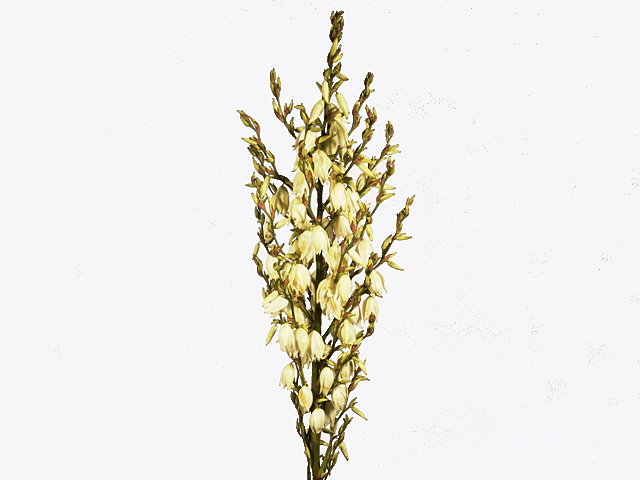Yucca flaccida

| Leaf tip | Pointed/acute |
| Leaf base | Perfoliate |
| Leaf margin | Serrate |
| Winter hardness | Good (USDA-zone 5, 6) |
| Flower color | White-white-155A |
| Leaf, general shape | Lanceolate |
| Flower diameter | 5 - 5,5 cm; 5,5 - 6 cm |
| Plant height | 1 - 1,2 m; 1,2 - 1,4 m |
| Flower length/hight | 3 - 3,5 cm; 3,5 - 4 cm |
| Inflorescence | Raceme |
| Flowering month(s) | July; August |
| Structure (tissues) | Woody |
| Leaf surface | Smooth |
| Leaf size | 30 - 40 cm; 40 - 50 cm |
| Light conditions | Sunny |
| Leaf division | Simple |
| Plant, growth type | Erect |
| Leaf, main color | Dark green |
| Leaf colour, pattern | Unicolored |
| Toxicity (if consumed) | Not or barely |
| Moisture requirements | Well-drained; Dry |
Yucca flaccida, also known as Yucca or Palmlilie, is a plant with several interesting features. Its leaves have a pointed or acute tip, and the leaf base is perfoliate. The leaf margin is serrate, adding to the plant's uniqueness. It has good winter hardness, suitable for USDA zones 5 and 6.
The flowers of Yucca flaccida have a white color with a slight shade of white-155A. They have a diameter ranging from 5 to 5.5 cm or 5.5 to 6 cm, depending on the variety. The plant itself can reach a height of 1 to 1.2 meters or 1.2 to 1.4 meters, adding a touch of elegance to any garden or landscape.
The inflorescence of Yucca flaccida is raceme, which means the flowers are borne on a spike, making for a visually appealing display. The plant typically blooms in July and August, adding a burst of color during the summer months.
Yucca flaccida is characterized by its woody structure, providing stability and durability to the plant. The leaves have a smooth surface and range in size from 30 to 40 cm or 40 to 50 cm, depending on the variety. The plant requires sunny light conditions to thrive and has simple leaf division.
The main color of the leaves is a dark green, adding depth and richness to the plant's appearance. The leaf color is unicolored, with no visible patterns. As for its toxicity, Yucca flaccida is not or barely toxic if consumed, making it a safer option for households with pets or children.
In terms of moisture requirements, Yucca flaccida prefers well-drained or dry soil conditions. It is essential to ensure proper drainage to prevent root rot and maintain the plant's health and vitality.
Overall, Yucca flaccida is a versatile and visually appealing plant. With its unique leaf shape, elegant flowers, and sturdy structure, it can enhance any garden or landscape, particularly in USDA zones 5 and 6. Its low toxicity and adaptability to various light and moisture conditions make it an excellent choice for both experienced and novice gardeners.
Market availability index by month:
| Jan. | Feb. | Mar. | Apr. | May | Jun. | Jul. | Aug. | Sep. | Oct. | Nov. | Dec. |
|---|---|---|---|---|---|---|---|---|---|---|---|
| 1 | 3 | 3 | 4 | 3 | 2 | 2 | 2 | 2 | 1 | 1 | 1 |